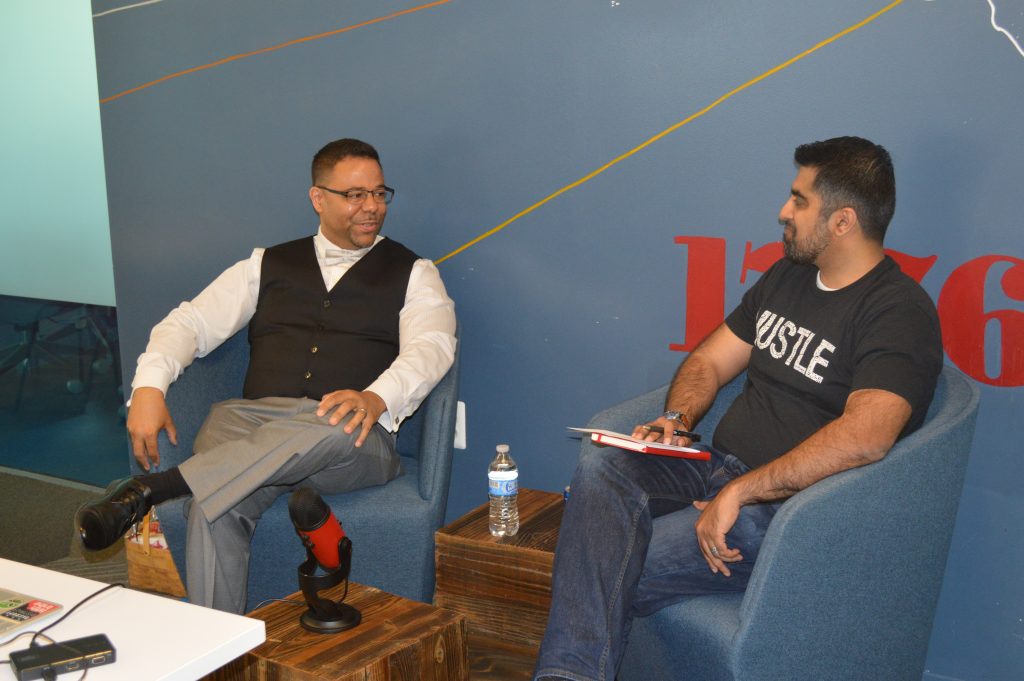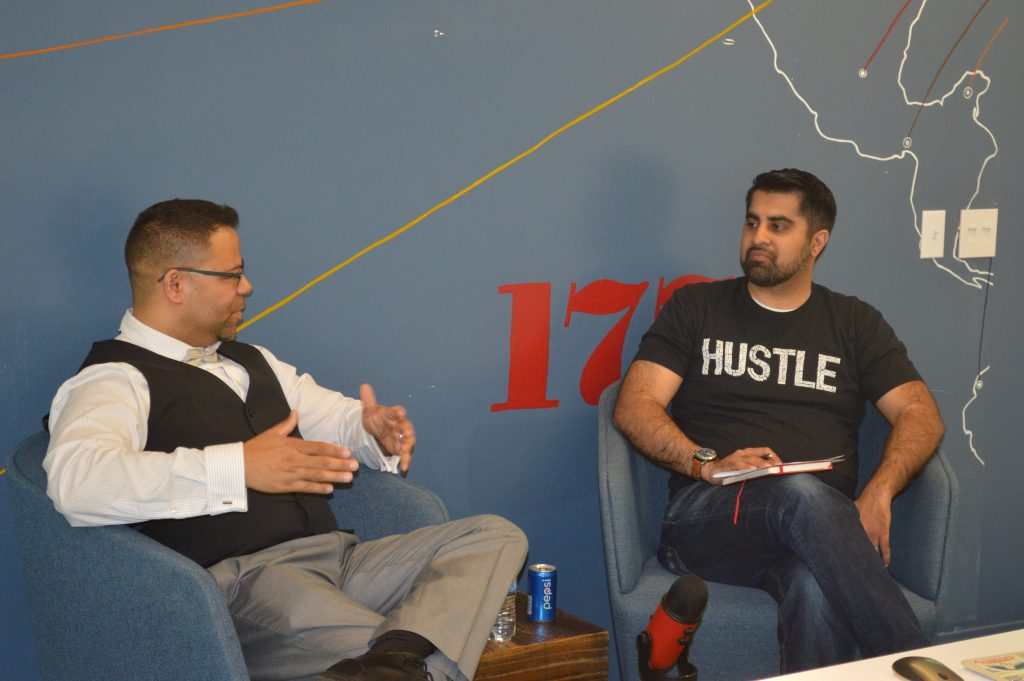Overview:
- Launched in mid-November of 2018, the Georgetown Pivot Program is a certificate program that was designed by Georgetown faculty for formerly incarcerated individuals. According to the Program’s website, it is a one-year transition and re-entry program that offers a blend of academic work and supported employment.
- George Chochos is the program director for Pivot, and in this interview, we hear about his journey from prison, to Yale, to Georgetown.
- George’s story is one of resilience, empowerment, and dedication. He is passionate about sharing the idea that everyone has potential and that there is untapped value and brilliance in every individual. Those who are ostracized from society and are stigmatized for their criminal backgrounds are robbed of opportunities to flourish. George believes that everyone – regardless of records or origins – deserves the opportunity to do great things for their community and for society.
Yesterday, Fifth Tribe welcomed George Chochos to the 1776 Startup Co-Working Space for the live recording of the fifth episode of the Campfire: Innovation and Impact Podcast. George sat down with Khuram Zaman, CEO of Fifth Tribe, for a Youtube livestream recording of their conversation, which revolved around George’s path, the Georgetown Pivot Program, and the importance of education and entrepreneurial opportunity for those returning to society from incarceration.

George’s Story: The Transformative Power of Education
Besides their involvement with the Georgetown Pivot Program, George and Khuram are connected by their New York roots. The conversation between the two New Yorkers kicked off with an overview of George’s path to incarceration. Reflective and transparent, George had nothing to hide about the experiences leading up to the long prison sentence that he was given in 2000. His brother’s suicide in 1995, friends who were poor influences, and drug use negatively impacted his life, leading him to serve over a decade in prison.
George reflected on his time at Sing Sing Correctional Facility, located in New York on the bank of the Hudson River, as an experience that unveiled why he needed to change his life. He remembers looking out at the spectacular views of the Hudson from inside the prison and feeling as though he was “experiencing a reality through bars.” At this time, higher education opportunities (e.g. Pell Grants under the Higher Education Act) were strictly limited due to defunding by the Clinton Administration. However, the sole program that was offered at Sing Sing was a Master of Professional Studies from the New York Theological Seminary. George’s interest was sparked, but he wondered how it would ever be possible to receive a Master Degree when there were no possible Bachelor Degree or other higher education programs available.
When George made it to the Eastern New York Correctional Facility, he had already been positively impacted by the few other programs and networks in preceding facilities. Knowing that changing the course of his life could be possible, he decided to take advantage of the Bard Prison Initiative (BPI) Program, which was launched by Bard College. BPI creates and protects academic spaces where students can pursue associate in arts (A.A.) degrees, followed by bachelor of arts (B.A.) degrees while serving prison sentences. The program is one-of-a-kind because it taps into the potential of individuals within the prison system; it acknowledges that, despite a person’s situation or history, they still have intellectual capacity and intrinsic value while incarcerated. The BPI admission process is highly selective and competitive, yet George earned admission to the program. Referencing this opportunity that he was given, George stated that, “I always wonder what people could do if they were just given the chance.” He was no longer a number in a dehumanizing system that saw him not for his potential, but rather for the value of his worst moments. As a BPI student, he felt both recognized and valued. According to George, the BPI program radically transformed his life and set him on a positive path. Education has a transformative power in the way that it opens up other doors and gives individuals the chance to discover their own strengths and to realign their relationships with themselves, their communities, and the world.
In Transition: From the Prison System to Yale
George received both an A.A. and a B.A. from Bard College, and when he was released early from prison in 2011, he felt called to continue to pursue his education and to use his experience to help others. But his transition back into society was anything but easy, even with the exceptional support system that he had. When asked by Khuram about whether or not he felt pressure to succeed and what his transition experience was like, George commented that he felt as though he went to sleep in 1999 and woke up in 2011. Familiar places felt foreign, and adjusting back to a life of freedom required taking deliberate and proactive steps towards a new norm.
One year after his release from prison, George visited Yale University. He said that as soon as he stepped onto campus, “[He] just knew, somehow, that [he] was going there.” He applied to Yale Divinity School and was accepted thirteen years after he was imprisoned; he was the first person with a felony record to be admitted. “They [the school] took a chance on me,” George said, “and I’m glad they did.” He was accepted in 2013 and spent three years pursuing a Master of Divinity and then another two years working towards a Master of Sacred Theology – the highest degree that Yale Divinity School offers. He graduated from Yale last year.

The Georgetown Pivot Program: What It Is & Why It’s Important
Out of the thousands of individuals who are released from D.C. correctional facilities each year, fewer than half find sustainable employment. Khuram referenced this fact when he asked, “Why is it difficult for individuals who were incarcerated to pursue jobs and entrepreneurship in education?” George answered that this crushing reality is a result of the societal stigma that surrounds a felony conviction. There is an idea that people who have been to prison are marked with a “scarlet letter” of sorts – that somehow, everyone who has a felony conviction is dangerous and a threat to society. This misconception is so imbedded into the collective imagination that it has created legal, psychological, and prejudicial barriers that prevent those who want to succeed the most from doing so. People who have been to prison are still people regardless of their situation, and imprisonment should not negate the right to pursue dreams and opportunities and to tap into individual potential.
Considering this distorted understanding of felons, the work that the Georgetown Pivot Program is doing is invaluable; not only does it challenge the cycle of crime and incarceration that devastates families and communities, but it prepares its participants to be entrepreneurial leaders and productive members of society. When asked why the Pivot Program is important, George answered that it targets a segment of society that is completely excluded from the opportunity to flourish because of their criminal background. “It is no one’s intention to go to prison,” he said, “But if they have the drive and the determination to share how they’ve learned from their experiences and to transform other people’s lives, then they should be given a second chance to pursue that dream.”
The current cohort of the Pivot Program has 15 members, and they are adding value to a wide gamut of agencies and organizations where they are currently working for as interns. For example, some individuals are working for nonprofits and architecture firms, while some are here at Fifth Tribe! Two Pivot Fellows, Marquis and Marcus, have recently joined our team, and they have been incredible additions. George raved about the current Fellows, stating they are brilliant in more ways than one: “They want to be entrepreneurs. But not for themselves – they want to be social entrepreneurs. They want to give back. They want to add value and change circumstances in their community.” Though their interests are different, Fellows in the Pivot Program share the passion to give the opportunities that were not given to them to other people. “When we do that,” George said, “society wins. Society doesn’t win by relegating people into permanent underclass citizens for the rest of their lives.” When everyone succeeds, we all succeed.
How To Get Involved w/ the Pivot Program
If you would like to support the Georgetown Pivot Program, please consider donating. These contributions leverage impact, so your donations contribute to the positive transformation of lives and communities. Interested business owners should also consider hosting a Pivot Fellow. The program is flourishing, and partnerships are open the doors of opportunity for more growth. More information for donors and employers can be found here.
Campfire is a podcast celebrating impact and innovation in the Washington D.C. Metropolitan Area. Subscribe on Fifth Tribe’s Youtube Channel!

